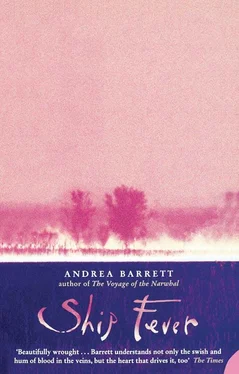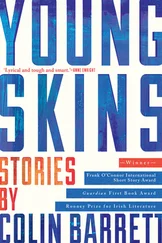This was not the kind of conversation they’d had during walks and meals since that first time on the rocks: who they were, where they’d come from, how they’d made it here. This was the talk where they instinctively edited out the daily pleasures of their lives on the mainland and spliced together the hard times, the dark times, until they’d constructed versions of themselves that could make sense of what they’d just done.
For months after this, as they lay in stolen, secret rooms between houses and divorces and jobs and lives, Jonathan would tell Ruby that he swallowed her nail. The nail dissolved in his stomach, he’d say. It passed into his villi and out to his blood and then flowed to bone and muscle and nerve, where the molecules that had once been part of her became part of him. Ruby, who always seemed to know more acutely than Jonathan that they’d have to leave whatever room this was in an hour or a day, would argue with him.
“Nails are keratin,” she’d tell him. “Like hooves and hair. Like wool. We can’t digest wool.”
“Moths can,” Jonathan would tell her. “Moths eat sweaters.”
“Moths have a special enzyme in their saliva,” Ruby would say. This was true, she knew it for a fact. She’d been so taken by Jonathan’s tale that she’d gone to the library to check out the details and discovered he was wrong.
But Jonathan didn’t care what the biochemists said. He held her against his chest and said, “I have an enzyme for you.”
That night, after the fire burned out, they slept for a couple of hours. Ruby woke first and watched Jonathan sleep for a while. He slept like a child, with his knees bent toward his chest and his hands clasped between his thighs. Ruby picked up the tipped-over chair and swept the fragments of broken glass onto a sheet of paper. Then she woke Jonathan and they tiptoed back to the rooms where they were supposed to be.
Imagine an April evening in 1762. A handsome house set in the gently rolling Kent landscape a few miles outside the city of London; the sun just set over blue squill and beech trees newly leafed. Inside the house are a group of men and a single woman: Christopher Billopp, his sister Sarah Anne, and Christopher’s guests from London. Educated and well-bred, they’re used to a certain level of conversation. Just now they’re discussing Linnaeus’s contention that swallows retire under water for the winter — that old belief, stemming from Aristotle, which Linnaeus still upholds.
“He’s hardly alone,” Mr. Miller says. Behind him, a large mirror reflects a pair of portraits: Christopher and Sarah Anne, painted several years earlier as a gift for their father. “Even Klein, Linnaeus’s rival, agrees. He wrote that a friend’s mother saw fishermen bring out a bundle of swallows from a lake near Pilaw. When the swallows were placed near a fire, they revived and flew about.”
Mr. Pennant nods. “Remember the reports of Dr. Colas? Fishermen he talked to in northern parts claimed that when they broke through the ice in winter they took up comatose swallows in their nets as well as fish. And surely you remember reading how Taletini of Cremona swore a Jesuit had told him that the swallows in Poland and Moravia hurled themselves into cisterns and wells come autumn.”
Mr. Collinson laughs at this, although not unkindly, and he looks across the table at his old friend Mr. Ellis. “Hearsay, hearsay,” he says. He has a spot on his waistcoat. Gravy, perhaps. Or cream. “Not one shred of direct evidence. Mothers, fishermen, itinerant Jesuits — this is folklore, my friends. Not science.”
At the foot of the table, Sarah Anne nods but says nothing. Pennant, Ellis, Collinson, Miller: all distinguished. But old, so old. She worries that she and Christopher are growing prematurely old as well. Staid and dull and entirely too comfortable with these admirable men, whom they have known since they were children.
Their father, a brewer by trade but a naturalist by avocation, had educated Christopher and Sarah Anne together after their mother’s death, as if they were brothers. The three of them rambled the grounds of Burdem Place, learning the names of the plants and birds. Collinson lived in Peckham then, just a few miles away, and he often rode over bearing rare plants and seeds sent by naturalist friends in other countries. Peter Kalm, Linnaeus’s famous student, visited the Billopps; Linnaeus himself, before Sarah Anne was born, once stayed for several days.
All these things are part of Sarah Anne’s and Christopher’s common past. And even after Christopher’s return from Cambridge and their father’s death, for a while they continued to enjoy an easy exchange of books and conversation. But now all that has changed. Sarah Anne inherited her father’s brains but Christopher inherited everything else, including his father’s friends. Sarah Anne acts as hostess to these men, at Christopher’s bidding. In part she’s happy for their company, which represents her only intellectual companionship. In part she despises them for their lumbago and thinning hair, their greediness in the presence of good food, the stories they repeat about the scientific triumphs of their youth, and the fact that they refuse to take her seriously. Not one of them has done anything original in years.
There’s another reason, as well, why she holds her tongue on this night. Lately, since Christopher has started courting Miss Juliet Colden, he’s become critical of Sarah Anne’s manners. She does not dress as elegantly as Juliet, or comport herself with such decorum. She’s forward when she ought to be retiring, he has said, and disputatious when she should be agreeable. He’s spoken to her several times already: “You should wear your learning modestly,” he lectures.
She does wear it modestly, or so she believes. She’s careful not to betray in public those subjects she knows more thoroughly than Christopher. Always she reminds herself that her learning is only book-learning; that it hasn’t been tempered, as Christopher’s has, by long discussions after dinner and passionate arguments in coffeehouses with wiser minds.
And so here she is: learned, but not really; and not pretty, and no longer young: last month she turned twenty-nine. Old, old, old. Like her company. She knows that Christopher has begun to worry that she’ll be on his hands for life. And she thinks that perhaps he’s mentioned this worry to his friends.
They’re fond of him, and of Burdem Place. They appreciate the library, the herbarium, the rare trees and shrubs outside, the collections in the specimen cabinets. They appreciate Sarah Anne as well, she knows. Earlier, they complimented the food, her gown, the flowers on the table and her eyes in the candlelight. But what’s the use of that sort of admiration? Collinson, who has known her the longest, was the only one to make a stab at treating her the way they all had when she was a girl: he led her into quoting Pliny and then complimented her on her learning. But she saw the way the other men shifted uneasily as she spoke.
Despite herself, she continues to listen to the men’s conversation. Despite her restlessness, her longing to be outside in the cool damp air, or in some other place entirely, she listens because the subject they’re discussing fascinates her.
“I had a letter last year from Solander,” Ellis says. “Regarding the November meeting of the Royal Society. There, a Reverend Forster said he’d observed large flocks of swallows flying quite high in the autumn, then coming down to sit on reeds and willows before plunging into the water of one of his ponds.”
“More hearsay,” Collinson says.
But Pennant says it might be so; either that or they slept for the winter in their summer nesting holes. “Locke says that there are no chasms or gaps in the great chain of being,” he reminds them. “Rather there is a continuous series in which each step differs very little from the next. There are fishes that have wings, and birds that inhabit the water, whose blood is as cold as that of fishes. Why should not the swallow be one of those animals so near of kin to both birds and fish that it occupies a place between both? As there are mermaids or seamen, perhaps.”
Читать дальше
Конец ознакомительного отрывка
Купить книгу












